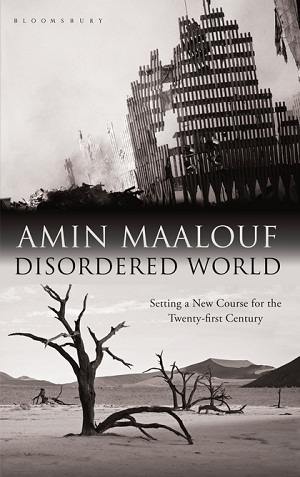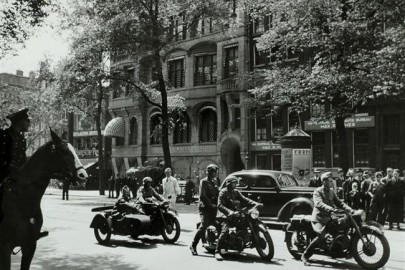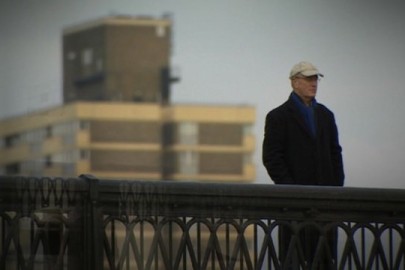‘We seem to have lost any sense of what it is to be human’…Elberry reviews Lebanese intellectual Amin Maalouf’s exploration of the post-9/11 world…
In general, I try to avoid knowing anything about politics, foreign affairs, or the world; that way, I can’t have opinions and so avoid strife. I am nonetheless regularly humiliated by people who really know things (for example that Chicago isn’t in Florida, or that Germany has an air force). It’s also a bad idea to have opinions about anything actually happening now.
Maalouf is braver and considerably more knowledgeable than me, and it shows. Among other things, Disordered World looks at the state of power in the 21st Century, the Middle East, mass immigration, terrorism, Nasser, the EU, America and anti-American sentiment. To put it simply, Maalouf’s premise is that: “We have embarked on this century without a compass” and the ship of humanity is now veering disastrously off course.
I disagree with a great deal of this book. However, Maalouf writes without pretension and the general slant of his mind is sympathetic; and he avoids many of the simplistic black and white positions of political theorists and tenured frothy-mouthers. So on the one hand he writes of America’s often brutal interventions (in Indonesia and Iran), and sternly notes that the whole world is affected by the decisions of Obama or Bush, yet only American citizens get to vote. Then he argues that America should continue as global policeman:
If it acts on the international stage with subtlety and fairness, if it forces itself to consult other nations respectfully rather than handing down diktats, if it makes it a point of honour to apply to itself first what it demands of others, if it clearly distances itself from immoral practices which have too often sullied its record throughout the world, and if it leads the global mobilisation against the economic crisis, global warming, epidemics, endemic disease, poverty, injustice and discrimination, then its role as first power will be accepted and applauded.
I find this extremely naïve and improbable but there is something admirable about such an adroitly naïve holding of apparently opposing sentiments. It suggests a man who is, to use Dante’s term, a party of himself.
He has much to say on the Middle East and the overwhelming military and economic supremacy of America:
Anyone wishing to remain in power has to make himself acceptable to the superpower, even if, in order to do so, he has to go against the wishes of his people. Those who are radically opposed to the US, whether by arms or violent rhetoric, generally have an interest in staying in the shadows.
And so two parallel political universes developed, one visible but lacking popular support, and the other hidden and possessing a certain popularity, but unable to assume the responsibility of power long-term. Those who represent the former are perceived as native lackeys in the pay of the enemy; those who represent the latter are mere outlaws.
[…]
For any human society, the absence of legitimacy is a form of weightlessness which disturbs all forms of behaviour. When no authority, institution or individual is able to boast true moral credibility, when people come to believe that the world is a jungle in which the survival of the fittest is the universal law, and where any action is permissible, then a drift towards deadly violence, tyranny and chaos becomes inevitable.
The way we regard our leaders does affect the way we regard each other, our country, ourselves (and the way we regard ourselves, our country, each other, affects everything else). I am uneasy with gross generalisations about, e.g. “the Arabs” but Maalouf’s generalisations are at least interesting and informed. Of suicide bombers and Arab culture:
It is in the history of a people who have known a great moment of glory followed by a long decline. For two hundred years they have aspired to rise again, but each time they fall back down.
People don’t just live for food and shelter; they live for the essentially intangible – to feel valued, to have pride in their way of life, their country, their home. It is these ungraspable forces, imaginative and unpredictable, which impel people to do more than get up and eat and then go back to bed; and if they see nothing to live for beyond purely physical stimulation, they will numb themselves with drugs or entertainment, or destroy themselves and those about them. For Maalouf, an imaginative ordering is essential:
From my point of view, leaving behind the disorder that affects the world for something better requires adopting a scale of values based on the primacy of culture. I would go so far as to say based on salvation through culture.
This is subtler (dreamier) than conventional political/economic remedies, and harder to sell. After reading my way through a great deal of economics, however, I appreciate a non-economic approach. Maalouf steers clear of the conventional temptations – for example, the temptation to decry or fawn on capitalism and the modern world:
I agree that there is no shame in making money. Nor, I believe, is there any shame in enjoying the fruits of prosperity. Our age offers us so many good and beautiful things that it would be an insult to life to refuse to enjoy them. But should money be completely disconnected from all production, from all physical and intellectual effort, all socially useful activity?
He returns to the touchstone of culture, of our imaginative reality:
Is there any need to spell out that this financial disorder is also – and perhaps above all – a symptom of the disorder in our scale of values?
One could say our financial lunacy is one aspect of a general disorder, that it is of a piece with the ugly style and meretricious jargon of modern academia, of drug addiction, increasingly insubstantial politicians, Richard Madeley. There is precious little substance to things, whether it is academic prose, money, public figures; or rather, there is little substance to that which has worldly authority. The private, the invisible, the uninfluenced and apparently powerless, that is still potent – precisely because it has no worldly authority.
I feel Maalouf is right to privilege culture and the individual. He has a nuanced and complex understanding of culture:
My profound conviction is that too much weight is placed on the influence of religion on people, and too little on the influence of people on religion. From the moment in the fourth century when the Roman empire became Christian, Christianity became Roman – abundantly so. It is this historical circumstance which explains the emergence of a sovereign papacy. Taking a wider view, if Christianity contributed to making Europe what it became, Europe also contributed to making Christianity what it became. The two pillars of Western civilisation – Roman law and Athenian democracy – both pre-date Christianity.
Cultures are not unchanging monoliths but rather flow into and inform each other. And individuals form a culture, and are formed thereby.
I am disappointed when Maalouf later places (as I see it) undue faith in science but on the whole he resists the inflated grandiosity of much political thought (which is, in any case, another symptom of the “disordered world”, a divorce between thought and reality). I think it’s important to resist the temptations of lazy thought, cheap generalisation; and to acknowledge the individual (which doesn’t necessarily mean being nice). Lazy thinking is not merely an intellectual error; applied to people it is, as Maalouf notes, a sign of contempt:
Perhaps I can illustrate this by recounting an incident which happened in Amsterdam at the beginning of this century. A young women of Algerian origin went to the town hall with a project that was close to her heart: a club for immigrant women in her neighbourhood, which would enable them to meet each other, get out of the close family environment for a while, relax in a hamam and talk openly about their problems. A council official met her, listened and took notes. She asked her to come back a few weeks later to find out whether the council could help her. The young women went off feeling confident. When she returned on the specified date, she was told that unfortunately the project could not go ahead. ‘We consulted your local imam and he said it wouldn’t be a good idea. Sorry!’
[…]
An ingenuous question comes to mind: if the young woman who presented the project had been European, would they have left the decision in the hands of her parish priest or pastor? Of course not. And why not?, one might ask equally ingenuously. The responses will inevitably be awkward. The answer lies in what is unspoken but understood, and in preconceptions about ethnicity. To put it bluntly, we act like this because ‘those people’ are not like ‘us’.
We seem to have lost any sense of what it is to be human. And so various idols (science, finance, Nazism, Marxism) have muscled in. It is difficult to even sketch out a possible aetiology though one could see the loss of Christianity as significant; once, man was Imago Dei, the image of God, and so the cosmos was anthropocentric. Now, we have as it were exiled humanity from our understanding of reality, and made gods of our devices. I’m not an optimist but I feel Maalouf is on the right road; that art can restore a sense of the individual, that there is something inscrutable and vital in human experience, something more than human, if you like. Without this there is disorder because no centre, no sense of the individual as truly individual (and so human).
In Watchmen Dr Manhattan says: “I can change almost anything…but I can’t change human nature.” That could stand as a warning to the grandiose theorists of our disordered world. If you don’t understand human nature, how can you understand your world? – since you are, after all, human.











Maalouf’s Samarkand is an unusually beautiful novel that I should get around to re-reading.
Many of our problems result from our failure to consider our limitations and tendencies as human beings. This is particularly sad as it should have been the first lesson of Communism.
good review elb
Elberry, this is the second time i’ve gone out to buy a book on the strength of your reviews. Keep them coming.